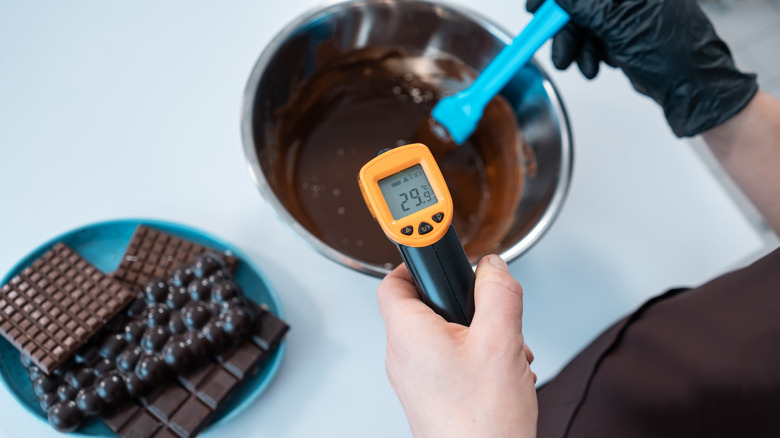An Expert Explains The Best Way To Temper Chocolate
Tempered chocolate is the ultimate ingredient for dipping cookies and fruit, as well as for making chocolate bark and coating truffles. The multistep process of tempering chocolate involves attaining the best chemical structure it heats and cools. While this sounds complicated, Nicole Patel, Owner and Chocolatier of Delysia Chocolatier, provided Daily Meal with expert advice on the best way to temper chocolate.
"Chocolate can be melted in either a double boiler or in the microwave," says Patel. In particular, using a double boiler is one of the best ways to melt white chocolate without burning it. She explains that a double boiler is just a glass bowl or other heat-proof container that rests over a saucepan with at least 1 inch of water simmering in the bottom. You don't want the bottom of the bowl to touch the water, she noted, because it will burn. Instead, it should sit above the water line so that the chocolate can melt slowly in the steam.
Patel also gave a couple of tips for using a microwave to temper chocolate. First, you should avoid your microwave's full power option so that the confection doesn't burn. Instead, set the power to medium-high heat, which is 70% power on most microwaves. Second, stir the chocolate every 30 seconds to make sure that it melts evenly. Finally, don't stop the microwaving process until the chocolate has completely liquified.
Melting the chocolate is just the first step in tempering. Fortunately, Patel gave us detailed insight into the rest of the process.
Temperature is everything when it comes to tempering chocolate
The trickiest part about tempering chocolate is that the cocoa butter in it is made of six distinct crystals, some of which aren't stable. Since each of the crystals set at different temperatures, Patel emphasizes the importance of using a candy thermometer to track the chocolate's heat level throughout the process. She starts by melting two-thirds of her chocolate until it reaches about 115 degrees Fahrenheit, keeping in mind that the temperature of your chocolate cannot be heated beyond 120 degrees. However, a key difference between tempering white vs dark chocolate is that it shouldn't be heated above 110 degrees.
When the chocolate reaches the right temperature, Patel sets the bowl on the counter for the seeding process. This involves gradually adding the remainder of the chopped chocolate to the bowl, continuously stirring vigorously to bring down the temperature of the melted chocolate. "Stir until the temperature drops to 84 degrees Fahrenheit," she explains, "This can take some time, usually about 15 minutes, keeping in mind that a glass bowl could take longer to cool."
Then, Patel places the bowl over the double boiler again or in the microwave for another five to 10 seconds until the chocolate reaches 89 degrees. At this point, she says that it's ready for dipping. You can use the heating pad hack for tempering chocolate in this final stage to maintain the temperature so that you can work with it before it stiffens.

